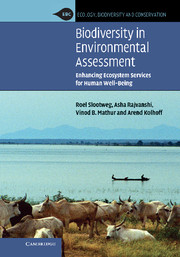Book contents
- Frontmatter
- Contents
- List of contributors
- Foreword
- Preface
- List of abbreviations
- Part I Setting the stage
- Part II Assessment tools
- Part III Emerging issues
- 8 Reconciling conservation and development: the role of biodiversity offsets
- 9 Valuation of ecosystem services: lessons from influential cases
- Epilogue – Topics in need of further elaboration
- Annex: valuation of ecosystem services: influential cases
- References
- Index
9 - Valuation of ecosystem services: lessons from influential cases
Published online by Cambridge University Press: 05 July 2014
- Frontmatter
- Contents
- List of contributors
- Foreword
- Preface
- List of abbreviations
- Part I Setting the stage
- Part II Assessment tools
- Part III Emerging issues
- 8 Reconciling conservation and development: the role of biodiversity offsets
- 9 Valuation of ecosystem services: lessons from influential cases
- Epilogue – Topics in need of further elaboration
- Annex: valuation of ecosystem services: influential cases
- References
- Index
Summary
Introduction
The concept of ecosystem services has received significant attention since the appearance of the Millennium Ecosystem Assessment (2003). Ecosystem services are the benefits people obtain from ecosystems (Box 9.1). A growing body of knowledge is developing on ecosystem services. Knowledge institutes around the world have worked with the concept of ecosystem services for years already. Environmental economics have produced an impressive collection of valuation studies (more than 3,000 have been reported by Environmental Valuation Reference Inventory (EVRI)), applying valuation techniques with ever increasing sophistication and reliability. Gradually the approach is being applied in practice, to support decision making and to guide development into a more sustainable direction. Yet, cases where economic valuation of ecosystem services has actually contributed to or exerted influence on strategic decision making on real-life policies, programmes, or plans remain scarce (Van Beukering et al., 2008). As Ehrlig already stated,
a general problem is the failure of ecological economists adequately to communicate their results and concerns to the general public and to decision makers. In view of the demonstrable failure of traditional economics to focus its attention on what will be the central issues of the twenty-first century, it is clear that ecological economics is in a position to become the central subdiscipline of economics.
(Ehrlig, 2008)- Type
- Chapter
- Information
- Biodiversity in Environmental AssessmentEnhancing Ecosystem Services for Human Well-Being, pp. 287 - 327Publisher: Cambridge University PressPrint publication year: 2009
- 1
- Cited by



